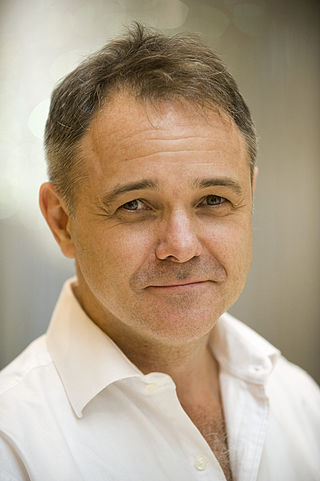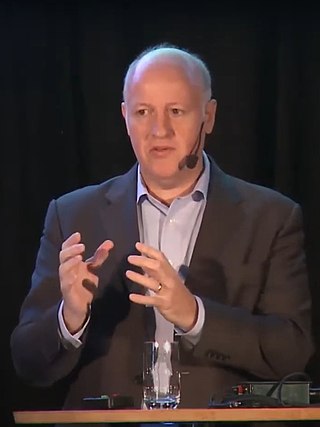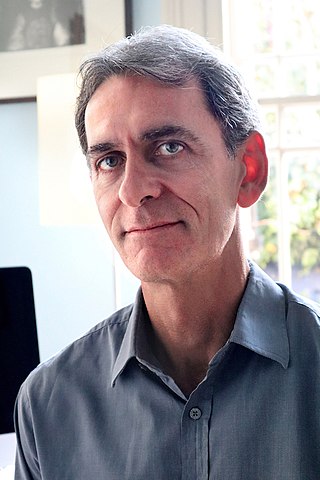EcoHealth Alliance is a US-based non-governmental organization with a stated mission of protecting people, animals, and the environment from emerging infectious diseases. The nonprofit is focused on research that aims to prevent pandemics and promote conservation in hotspot regions worldwide.

Nicholas Michael Landon Wade is a British author and journalist. He is the author of numerous books, and has served as staff writer and editor for Nature, Science, and the science section of The New York Times.
Anjana Ahuja is a British Indian science journalist and a former columnist for The Times. She is now a contributing writer at the Financial Times. She also contributes to The Daily Telegraph, Prospect, New Scientist and the Radio Times. She was named Best Science Commentator at the 2013 Comment Awards. Ahuja, who was educated at a comprehensive school in Essex, read physics at Imperial College London, and then took a PhD in space physics during which she worked on data about the Sun's magnetic field from the Ulysses probe.

Sir Jeremy James Farrar is a British medical researcher who has served as director of the Wellcome Trust since 2013 and will serve as chief scientist at the World Health Organization in 2023. He was previously a professor of tropical medicine at the University of Oxford.

Sir Christopher John MacRae Whitty is a British epidemiologist serving as Chief Medical Officer for England (CMO) and Chief Medical Adviser to the UK Government since 2019.

Neil Morris Ferguson is a British epidemiologist and professor of mathematical biology, who specialises in the patterns of spread of infectious disease in humans and animals. He is the director of the Jameel Institute for Disease and Emergency Analytics (J-IDEA), director of the MRC Centre for Global Infectious Disease Analysis, and head of the Department of Infectious Disease Epidemiology in the School of Public Health and Vice-Dean for Academic Development in the Faculty of Medicine, all at Imperial College London.

Dame Sarah Catherine Gilbert is an English vaccinologist who is a Professor of Vaccinology at the University of Oxford and co-founder of Vaccitech. She specialises in the development of vaccines against influenza and emerging viral pathogens. She led the development and testing of the universal flu vaccine, which underwent clinical trials in 2011.

The COVID-19 pandemic in the United Kingdom is a part of the worldwide pandemic of coronavirus disease 2019 (COVID-19) caused by severe acute respiratory syndrome coronavirus 2 (SARS-CoV-2). In the United Kingdom, it has resulted in 24,311,933 confirmed cases, and is associated with 211,155 deaths.
The Scientific Advisory Group for Emergencies (SAGE) is a British Government body that advises central government in emergencies. It is usually chaired by the United Kingdom's Chief Scientific Adviser, currently Sir Patrick Vallance. Specialists from academia and industry, along with experts from within government, make up the participation, which will vary depending on the emergency. SAGE gained public prominence for its role in the 2020 COVID-19 pandemic in the United Kingdom.

Peter Daszak is a British zoologist, consultant and public expert on disease ecology, in particular on zoonosis. He is the president of EcoHealth Alliance, a nonprofit non-governmental organization that supports various programs on global health and pandemic prevention. He is also a member of the Center for Infection and Immunity at the Columbia University Mailman School of Public Health. He lives in Suffern, New York.

The Beta variant, (B.1.351), was a variant of SARS-CoV-2, the virus that causes COVID-19. One of several SARS-CoV-2 variants initially believed to be of particular importance, it was first detected in the Nelson Mandela Bay metropolitan area of the Eastern Cape province of South Africa in October 2020, which was reported by the country's health department on 18 December 2020. Phylogeographic analysis suggests this variant emerged in the Nelson Mandela Bay area in July or August 2020.

There are many variants of severe acute respiratory syndrome coronavirus 2 (SARS-CoV-2), the virus that causes coronavirus disease 2019 (COVID-19). Some are believed, or have been stated, to be of particular importance due to their potential for increased transmissibility, increased virulence, or reduced effectiveness of vaccines against them. These variants contribute to the continuation of the COVID-19 pandemic.

Since the beginning of the COVID-19 pandemic, there have been efforts by scientists, governments, and others to determine the origin of the SARS-CoV-2 virus. Most scientists agree that, as with many other pandemics in human history, the virus is likely derived from a bat-borne virus transmitted to humans in a natural setting. Many other explanations, including several conspiracy theories, have been proposed. Some scientists and politicians have speculated that SARS-CoV-2 was accidentally released from a laboratory. This theory is not supported by evidence.

"Can you look them in the eyes?" is a 2021 public health campaign of the British government during the COVID-19 pandemic, designed to encourage the public to follow COVID restrictions. It was launched in January 2021 across radio and television, as well as in other media.

The COVID-19 lab leak theory, or lab leak hypothesis, is the idea that SARS-CoV-2, the virus that caused the COVID-19 pandemic, is the result of a laboratory leak. Most scientists believe the virus spilled into human populations through natural zoonosis, similar to the SARS-CoV-1 and MERS-CoV outbreaks, and consistent with other pandemics in human history. Available evidence suggests that the SARS-CoV-2 virus was originally harbored by bats, and spread to humans multiple times from infected wild animals at the Huanan Seafood Market in Wuhan, Hubei, China, in December 2019. There is no evidence SARS-CoV-2 existed in any laboratory prior to the pandemic. An original animal reservoir has not yet been confirmed, though several candidate species have been identified.

The Delta variant (B.1.617.2) was a variant of SARS-CoV-2, the virus that causes COVID-19. It was first detected in India on 5 October 2020. The Delta variant was named on 31 May 2021 and had spread to over 179 countries by 22 November 2021. The World Health Organization (WHO) indicated in June 2021 that the Delta variant was becoming the dominant strain globally.
Alina Chan is a Canadian molecular biologist specializing in gene therapy and cell engineering at the Broad Institute of MIT and Harvard, where she is a postdoctoral fellow. During the COVID-19 pandemic she became known for questioning the prevailing consensus regarding the origins of the virus and publicly advocating a laboratory escape hypothesis.

Mark Honigsbaum is a medical historian and journalist specializing in the history and science of infectious disease. He is currently a Senior Lecturer in the Department of Journalism at City, University of London.

The following is a timeline of the COVID-19 pandemic in the United Kingdom from July 2022 to December 2022.
The following is a timeline of the COVID-19 pandemic in the United Kingdom in 2023.












